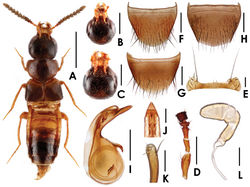Difference between revisions of "Tetrasticta bobbii"
m (Imported from ZooKeys) |
m (1 revision) |
(No difference)
| |
Latest revision as of 12:39, 24 April 2014
| Notice: | This page is derived from the original publication listed below, whose author(s) should always be credited. Further contributors may edit and improve the content of this page and, consequently, need to be credited as well (see page history). Any assessment of factual correctness requires a careful review of the original article as well as of subsequent contributions.
If you are uncertain whether your planned contribution is correct or not, we suggest that you use the associated discussion page instead of editing the page directly. This page should be cited as follows (rationale):
Citation formats to copy and paste
BibTeX: @article{Zheng2014ZooKeys404, RIS/ Endnote: TY - JOUR Wikipedia/ Citizendium: <ref name="Zheng2014ZooKeys404">{{Citation See also the citation download page at the journal. |
Ordo: Coleoptera
Familia: Staphylinidae
Genus: Tetrasticta
Name
Tetrasticta bobbii Zheng & Zhao, 2014 sp. n. – Wikispecies link – ZooBank link – Pensoft Profile
Type material
Holotype: China: ♂, labelled ‘CHINA: Yunnan Prov., Xishuangbanna, Mengla County (勐腊县), Nangongshan (南贡山), alt. 800–1000 m, 7.VII.2003, Hu & Tang leg. / HOLOTYPE [red], Tetrasticta bobbii sp. n., Zheng & Zhao det. 2014, SNUC’. Paratypes: China: 1 ♂, 1 ♀ (preserved in a small tube filled with 75% ethanol), same data as holotype, both bearing the following label: ‘PARATYPE [yellow], Tetrasticta bobbii sp. n., Zheng & Zhao det. 2014, SNUC’.
Description
Body (Fig. 1A) shining. Coloration: head black; antennae and pronotum reddish brown; elytra reddish brown with anterior margin reddish yellow; legs reddish yellow; abdomen with tergites II–IV reddish yellow, tergites VI–VII black. Head (Figs 1B, C) almost 1.05 times as wide as long; slightly narrower than pronotum; surface sparsely covered with yellow setae; eyes large. Antennae (Figs 1A, D) with segment I long, as long as combined length of segments II–III; segments II and III about one-half of segment I; segment IV extremely short, much wider than long; segments IV–V almost as wide as long; segments VI–X wider than long. Mandibles long, slender. Mentum distinctly transverse, about 3.62 times as wide as long; shaped as in Fig. 1E. Pronotum wider than long, about 1.38 times as wide as long; surface moderately covered with yellow setae; disc with three shallow depressions; shaped as in Fig. 1A. Elytra wider than long; surface moderately covered with yellow setae. Abdomen flattened, with subparallel lateral margins, widest at segments IV–V; tergite VIII with six pairs of macrosetae; sternite VIII (Fig. 1G) generalized in shape, posterior margin convex in the middle, with eight pairs of macrosetae.
Male: postocular margins straight for a short distance and then narrowed posteriorly (Fig. 1C); posterior margin of tergite VIII (Fig. 1F) broadly convex; median lobe of aedeagus (Figs 1I, J )slightly narrowed apically in lateral view; inner sac with flagellum coiled five times; apical lobe of paramerite (Fig. 1K) slightly dilated, apically with four setae.
Female: postocular margins immediately narrowed behind eyes (Fig. 1B); tergite VIII shaped as in Fig. 1H; spermatheca shaped as in Fig. 1L.
Distribution
Southwest China: Yunnan.
Measurements
Male: BL: 3.81–4.00; HL: 0.79–0.82; HW: 0.83–0.85; PL: 0.64–0.65; PW: 0.88–0.90; HW/HL: 1.05–1.06; PW/PL: 1.37–1.38; HW/PW: 0.94–0.95. Female: BL: 3.62; HL: 0.70; HW: 0.74; PL: 0.61; PW: 0.85; HW/HL: 1.06; PW/PL: 1.40; HW/PW: 0.87.
Remarks
Tetrasticta bobbii is most similar to Tetrasticta gnatha in overall body shape, relatively long mandibles, but can be readily distinguished form it by the distinctly long antennal segments II–III, the different shape of abdominal tergite VIII and the form of aedeagal median lobe.
Etymology
Named after the Pomeranian dog of senior author.
Original Description
- Zheng, D; Zhao, M; 2014: A new species of genus Tetrasticta Kraatz (Coleoptera, Staphylinidae, Aleocharinae) from Xishuangbanna, Southwest China ZooKeys, 404: 113-116. doi
Images
|
